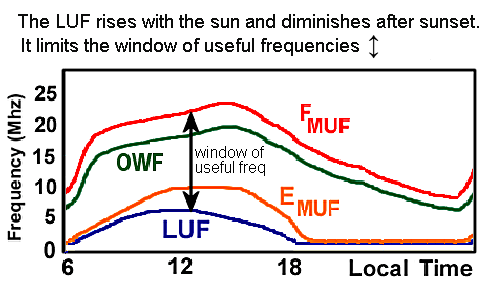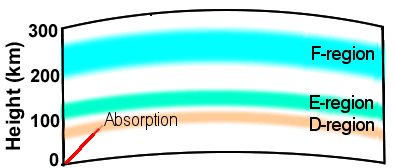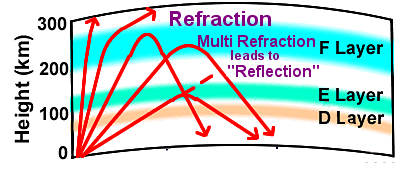 Understanding LUF and MUF
Understanding LUF and MUF
Usable Frequency Range
The range between the LUF and MUF forms the usable "HF skywave window."

Figure 1: Typical diurnal cycle based on NPS training materials🗗
| FMUF: F region maximum usable frequency OWF: optimum working frequency EMUF: E region maximum usable frequency LUF: The lowest usable frequency is due to D-region absorption, which limits the window of useful frequencies ↕ |
During the day, the ionospheric D region absorbs skywaves below ~10 MHz:
During the day, the ionospheric E and F regions refract skywaves:
Lowest Usable Frequency (LUF)
The Lowest Usable Frequency (LUF) is the minimum frequency at which an HF signal can travel via the ionosphere and reach a distant receiver without significant attenuation.
Factors affecting the LUF
- The D region absorbs frequencies below the LUF, preventing radio signals from reaching the higher E and F regions.
- From sunrise to noon, increased solar irradiation raises D-region absorption levels, resulting in a higher LUF.
- Intense solar flares can elevate the LUF beyond the Maximum Usable Frequency (MUF), leading to radio blackout events.
- Frequencies in the HF bands below 10 MHz consistently experience greater absorption compared to higher frequency bands.
Maximum Usable Frequency (MUF)
The Maximum Usable Frequency (MUF) is the highest frequency that can propagate via the ionosphere under specific conditions. Frequencies higher than the MUF will penetrate the ionosphere and continue into space.
Factors affecting the MUF
- Higher electron density in the ionosphere supports higher frequencies.
- Increased solar irradiation raises the MUF peaking at noon and in summers.
The project "Understanding HF Propagation" explains HF skywave propagation, as well as LUF and MUF concepts.

